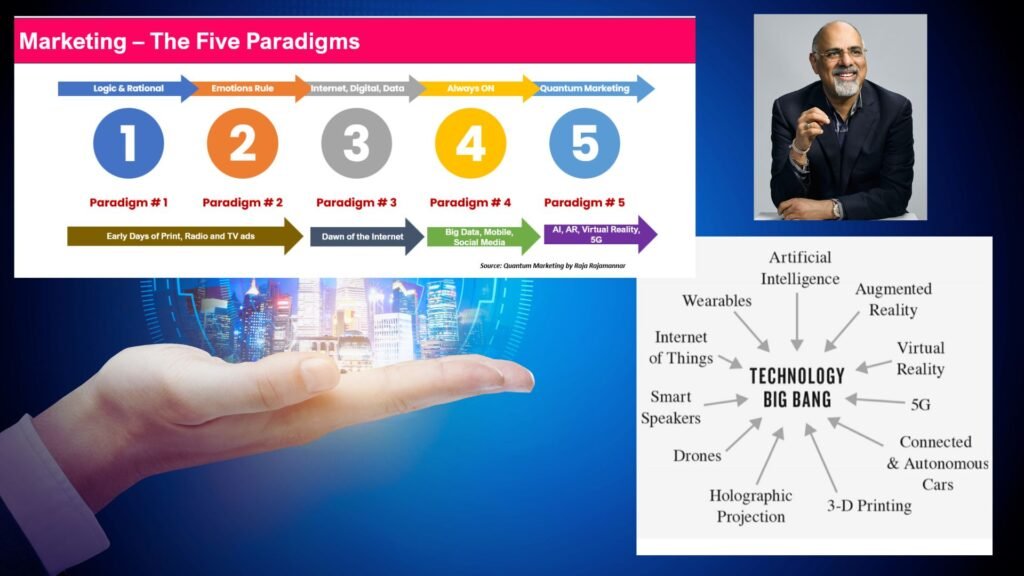
For anyone who wants to know where Marketing in the 21st Century is headed to, Quantum Marketing: Mastering the New Marketing Mindset for Tomorrow’s Consumers” authored by Raja Rajamannar is a must have!! After reading this book, I was not sure, if I should call this book a forward-looking practitioner’s guide, a text book of Marketing for the future or simply a Playbook. Whatever, one may want to call it – it is a thought-provoking concoction of theory and application on how Marketers should re-invent their approach of marketing for the new age. The real stories from Global Corporations add authenticity and credibility to the suggested approach.
All through the book, Raja keeps you engaged as he gradually unfolds the arrival of the age of Quantum Marketing (the Fifth Paradigm) as he calls it and how evolving technologies have brought about this change.
What is Quantum?
Quantum in its literary sense means abrupt change, a phenomenon that cannot be explained by traditional theories. Today’s world is experiencing change and disruption at such a swift and significant pace that the old marketing theories, strategies, and practices are quickly becoming outdated.
The Arrival of the Fifth Paradigm:
Raja outlines the evolution of marketing through what he identifies as four distinct paradigms, leading up to the current, fifth paradigm. Each paradigm marks the advent of path breaking technologies or changes in consumer behaviors (or both):
1. Paradigm 1: Logic and Rationale: This approach emphasized that if you have a great product, it will sell by itself.
2. Paradigm 2: Emotions: In this paradigm the Marketers discovered that emotions played role in consumer decisions and infused emotions in their ads. Television was an enabler in this paradigm.
3. Paradigm 3: The Internet, Digital Media and Data – In the Third Paradigm, data became key, enhancing customer experiences and enabling marketers to understand lifetime value and refine retention strategies, aligning with Kotler’s 4 Ps as a core competitive strategy element.
4. Paradigm 4: Always On: Exponential increase in processing power, miniaturization of components, affordable internet, big leap in intuitive interfaces, arrival of social media platforms have enabled the fourth paradigm.
The fifth paradigm, known as Quantum Marketing, is ushered in by a significant leap in technology. Infinite data, Artificial intelligence, blockchain, 5G, Virtual reality, augmented reality, and 3D Printers will dramatically change how consumers engage with brands and make purchasing choices.
So, what is in store for Marketers in the Fifth Paradigm?
To harness the full potential and impact of marketing in the future, a transformative approach to leadership and a revitalized purpose are essential. Success will belong to those businesses that can rejuvenate their marketing objectives, strategies, and practices.
Many marketing leaders currently have a limited perspective on marketing’s capabilities and limitations. Raja categorizes marketers along a spectrum, ranging from Contemporary marketers, who excel in technological aspects but lag in traditional marketing areas, to Classical marketers, who are versed in traditional marketing yet lack knowledge in business models, technology, and data analytics. It’s crucial to have leaders who embody the best of both worlds.
The intersection of marketing and consumer engagement in the Fifth Paradigm promises to be exceptionally dynamic. Marketers who underestimate the complexity of this junction without a deep understanding of emerging technologies and data analytics will likely falter. Nonetheless, mastering these domains is just part of the equation. Reimagining marketing’s mission and role for this new age is also vital.
According to Raja, Marketing’s mission in the Fifth Paradigm should encompass four key objectives:
1. Brand Building: Essential for differentiation, enhancing value perception, and securing a competitive edge. Developing a resilient brand over short, medium, and long-term horizons is crucial for a company’s vitality.
2. Reputation Management: In an era, rife with negative discourse and misinformation, safeguarding a brand’s reputation poses a significant challenge. Marketers must be adept at defending and maintaining their brand’s integrity.
3. Driving Business Growth: Simply creating a strong brand is not enough. Marketers need to be capable of propelling profitable growth, even beyond their traditional responsibilities.
4. Creating Platforms for Sustained Competitive Advantage: This is a cornerstone of the Fifth Paradigm, where lasting competitive advantages are forged through platforms, partnerships, and intellectual properties. The absence of tech-savvy leadership and capabilities in many firms underscores the urgency for Chief Marketing Officers (CMOs) to attract and integrate such talent. A balanced mix of Classical Marketers, Contemporary Marketers, Performance Marketers, and Marketing Innovators is indispensable for a company’s success.
Vinayak’s Key Take aways:
To redefine marketing’s purpose across the four objectives, modern marketers must transcend traditional specialization. Quantum Marketers are expected to possess a comprehensive knowledge of data, digital technologies, communications, public relations, sales, business operations, financial aspects of the company, and growth catalysts. They should embody the nexus of these diverse areas and more, cultivating a business manager’s perspective enriched with a profound inclination and understanding of marketing. Their role involves not only thinking innovatively and expansively but also motivating their teams to do the same, providing the necessary guidance along the way.
Equally critical is the task of preparing and motivating students for careers in marketing. Unfortunately, the curriculum in many MBA programs relies on case studies and materials that no longer reflect the current pace and nature of change in the field. In today’s fast-evolving landscape, it is paramount to provide students with the most current and effective resources available.






Good summary of the book. One gets glimpse into it. Particularly agree with you on the last para where you comment about the case studies being covered in B Schools.
Thank you Abhay. Glad that you liked it.